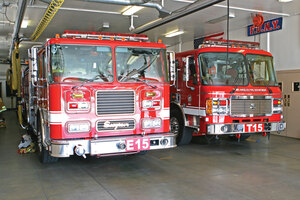LAFD budget cuts could affect emergency response time
Severe budget cuts at the Los Angeles Fire Department could mean a slower rescue for USC students who dial 911, according to an LAFD engineer.
In order to relieve a $39 million budget deficit, earlier this month Los Angeles Fire Chief Douglas Barry began implementing rolling “brownouts” — temporary furloughs which will take up to 87 firefighters out of the daily work rotation and leave one battalion command team, three emergency battalion offices, 15 fire trucks and nine ambulances unstaffed every day for a year, according to myFOXla.com.

You’re fired · With LAFD’s new rolling “brownouts,” one of Station 15’s two fire engines will remain idle periodically, as some Station 15 staff members will be dispersed throughout the city’s many fire stations. - Amaresh Sundaram Kuppuswamy | Daily Trojan
At Station 15, the fire station on Jefferson Boulevard that services the USC area, this means periodically having only one engine and a smaller staff to work with.
Greg Sweet, an engineer at Station 15, said the station consists of a special task force and two engines. One of those engines operates together with a truck, known as the “light force.”
“When they do the brownout, they’ll shut the light force, so that’s six people on that company, with three shifts, not working,” Sweet said.
This cut represents more than 50 percent of the Station 15 staff, Sweet said. Although none of the staff members at Station 15 were laid off, some will be spread out among other Los Angeles stations to fill vacancies during brownouts.
As a result, the station’s ability to respond quickly to calls that come in during brownouts could be severely impaired, Sweet said.
“There’s definitely an impact, especially now that school is in session. There are a lot of demands and emergency calls that are generated,” he said. “If we’re busy, if the engine is busy, they’ll have to get a company from another station, so there’ll probably be a delay.”
The nine day-long brownouts are set to occur on a rolling basis every three weeks. During brownouts, stations will also be expected to assist with calls across the city if the local stations in those areas are unable to respond. Responses, Sweet said, will likely be less immediate.
“Yesterday we went to a structural fire call on 50th Street and Budlong, which is way out of our district, and we were the first engine company on scene,” Sweet said. “We passed at least three or four other stations that should have been there prior to us, so that’s one example of the delay in getting somewhere.”
Derrick Matsuda, a graduate student studying electrical engineering who lives in Torrance and remembers being affected by local brush fires said he thought the cuts were a big issue.
“Maybe not right now, but if there ever were to be multiple fires, we’d be in trouble,” Matsuda said.
Paul Glavin, an undeclared sophomore, said he thought it was an unfortunate situation because students weren’t fully aware of the brownouts.
“I feel like people would be much more concerned about it if they were forced into the situation,” he said. “I would be furious if that situation actually came up. I would probably start an organization to get back the other engine.”
Sweet said he understood that the cuts were being made to fix the budget deficit, but they were also having a direct effect on the ability of the fire department to do its job.
“This is one solution. But this is what the department does — take care of all the people — and that’s where they’re cutting our resources,” he said.
Glavin said he would also prefer to have more fire trucks, but understood why the budget cuts were an important issue to locals.
“I don’t pay taxes, so personally I don’t care. I would like to see more fire trucks, but I also understand if other people were mad because they would have to pay higher taxes,” he said.
